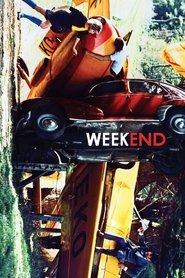With its pop art color scheme and two-dimensional characters, Weekend is less like a novel than a pamphlet, and more like a fairy tale than either. The presiding trope is Alice’s tumble down the rabbit hole.
— Gary Indiana (Criterion)
[The] film has structural issues that make it seem longer than it is. This is especially apparent during the final, somewhat overlong sequence in the woods, which has a meandering quality markedly different from the bulk of the road-movie narrative. When people describe Godard’s pre-’68 films as “jazz-like,” it’s precisely this improvisatory feel that they’re referring to, and it often has the consequence of appearing aimless and unrefined. Godard could certainly self-edit when necessary […], but he also knew the potency of excess. Weekend […] is virtually defined by its aesthetic and intellectual overflow, its formal cup runneth over with ideas that don’t all work, but don’t all need to. And this is a necessary function of its thesis. As a film attacking the ceaseless consumption of its audience, it only makes sense that Weekend always feeds them more: more images, more colors, more bloodshed. How is the film itself constructed if not as an endless traffic jam, each car bursting at the seams with hostility and impatience, Godard the one free car whizzing past to indignant honking?
— Calum Marsh (Slant)

